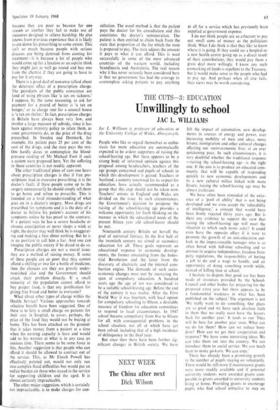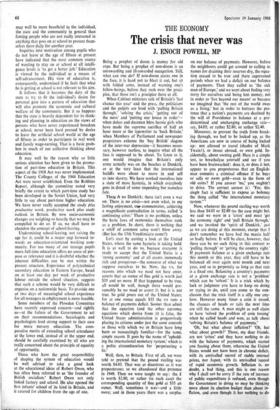Unwillingly to school
THE CUTS-3: EDUCATION JAC L. WILLIAMS
Jac L. Williams is professor of education at the University College of Wales, A berysiwyM.
People who like to regard themselves as enthu- siasts for more education are automatically expected to be ardent supporters of raising the school-leaving age. But there appears to be a strong body of informed opinion against this proposal among headteachers, teachers of the age groups concerned and pupils of schools to which this development is geared. Teachers in Scotland, a country renowned for its respect for education, have actually recommended as a group that this step should not be taken now. Teachers' unions in England and Wales are divided on the issue. In such circumstances, the Government's decision to postpone the raising of the school-leaving age provides a welcome opportunity for fresh thinking on the manner in which the educational needs of the present fifteen year old school-leaver should be met.
Nineteenth century Britain set herself the goal of universal literacy. In the first half of the twentieth century we aimed at secondary education for all. These goals represent an educational response to economic develop- ments, the former emanating from the Indus- trial Revolution and the latter from the discovery of electricity and the internal com- bustion engine. The demands of such socio- economic changes were met by increasing the span of compulsory education. A hundred years ago the age of ten was considered to be a suitable school-leaving age. Before the end of the century it was twelve. After the First World War it was fourteen, with local option for compulsory schooling to fifteen, a desirable measure of freedom for education committees to respond to local circumstances. In 1947 school became compulsory from five to fifteen for all, with consequential problems in the school situation, not all of which have yet been solved, including that of a high incidence of delinquency in the final year.
But since then there have been further sig- nificant changes in British society. We have felt the impact of automation, new develop- ments in sources of energy and power, ever increasing mobility of men and ideas, more leisure, immigration and other cultural changes affecting our socio-economic lives at an ever quickening pace. In such circumstances, it is very doubtful whether the traditional response —raising the school-leaving age—is the right one. If the aim is to produce an educated com- munity that will be capable of responding quickly to new economic developments and to a new cultural milieu linked with more leisure, raising the school-leaving age may be almost irrelevant.
We have often been reminded of the exist- ence of a 'pool of ability' that is not being developed and we even accept the 'educability of intelligence,' a concept that would have been firmly rejected thirty years ago. But is there any evidence to support the view that raising the school-leaving age will meet the situation to which such terms refer? It could even have the opposite effect if it were to promote the growth of an anti-education out- look in the impressionable teenager who is so often bored with full-time schooling and so anxious to acquire independence, freedom from petty regulations, the responsibility of having a job to do and a wage to handle, and an opportunity of doing something worth while, instead of killing time at school.
I hesitate to dispute that good use has been made of resources provided by the Schools Council and other bodies for preparing for the proposed extra year but there appears to be a fundamental weakness in what has been published on the subject.'The argument is not 'We really want to do something. Our plans are so good and we have such absolute faith in them that we really must have the leavers back for another year.' It tends to run They will be here for another year soon. What can we do for them? How can we reduce bore- dom? How can we get their cooperation and response? We have some interesting ideas. We can take them out into the country. We can introduce them to social service. We can teach them to make go-karts. We can cope.'
There has already been a promising growth in the number of pupils staying on voluntarily. There would be still more if maintenance grants were more readily available and if potential university students were awarded grants com- parable to grants awarded to university students living at home. Providing grants to encourage pupils who find school attractive to stay on may well be more beneficial to the individual, the state and the community in general than forcing people who are not really interested in anything that goes on at school to present them- selves there daily for another year.
Inquiries into motivation among pupils who do not leave at the age of fifteen at present have indicated that the most common source of wanting to stay on at school at all intelli- gence levels is `to get a better job.' Education is viewed by the individual as a means of self-advancement. His view of education is, consequently, undermined if he feels that what he is getting at school is not relevant to his aim.
It follows that it becomes the duty of the state to try to fit the individual's desire for personal gain into a pattern of education that will also promote the economic and cultural welfare of the community. But it so happens that the state is heavily dependent for its think- ing and planning in education on the views of persons who have never experienced boredom at school, never been hard pressed by desire to leave the artificial school world at the age of fifteen in order to participate in real work and family wage-earning. That is a basic prob- lem in much of our collective thinking about education.
It may well be the reason why so little serious attention has been given to the promo- tion of part-time education in Britain. This aspect of the 1918 Act was never implemented. The County Colleges of the 1944 Education Act were never established. Even the Robbins Report, although the committee noted very briefly the extent to which part-time study has been developed in the Soviet Union, had very little to say about part-time higher education. We have never really accepted the study plus
productive work, productive work plus study outlook in Britain. By now socio-economic changes are weighing so heavily that we may be compelled to do so. If so, we shall have to abandon the concept of school-leaving.
Undermining school-leaving, not raising the age for it, could be a major step forward to- wards an education-orientated working com- munity. For too many of our teenage pupils more full-time education offers no sense of pur- pose or relevance and it is doubtful whether the inherent difficulties can be met within the present structure. Experience of polytechnical secondary education in Eastern Europe, based on at least one day per week of productive labour outside the school situation, suggests that such a scheme would be very difficult to organise on a nationwide basis. To provide one or two days of meaningful school experience for all teenagers in ethployment is more feasible.
Some members of the Plowden Committee have recently expressed concern—and rightly so—at the failure of the Government to act on their recommendations. Sociologists and psychologists lend strong support to their case for more nursery education. The com- parative merits of extending school attendance at the lower end, instead of at the upper end, should be carefully examined by all who are really concerned about the principle of equality of opportunity.
Those who have the great responsibility of shaping the system of education would be well advised to take a good look at the educational ideas of Robert Owen, who has often been referred to as `the founder of British socialism' Robert Owen not only linked factory and school. He also opened the first infants' school of its kind in Britain, and it catered for children from the age of one.



































 Previous page
Previous page